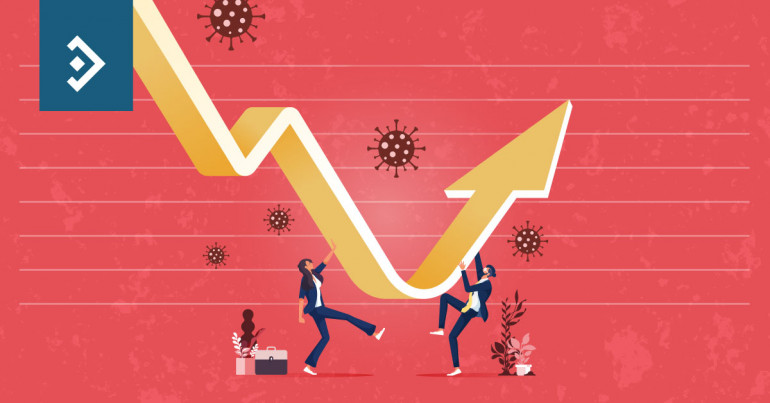
Vaccine rollout becoming desperate
Morning mid-market rates – The majors
14th January: Highlights
- Second wave outstrips first as record daily death toll in announced
- Beige Book points to modest Q4 growth
- Germany to back away?
Sterling facing up to slowing economy
This is a record for a single day and underlines the massive human cost of the Pandemic not just in the UK, but globally.
The sense of euphoria provided by the approval, rollout, and delivery of two working vaccines has now turned into a desperate race to get people inoculated as the NHS gets closer every day to being overwhelmed.
The economic cost of the Pandemic is not yet being fully felt as the Government has done all it can to ease the burden but several of the measures that have been put in place are close to expiry raising concerns.
The VAT cut and stamp duty holiday will need to be extended if the threat of business failing is to be limited to mostly the hospitality and travel sectors.
Every day seems to bring another call for support with Government borrowing already at peacetime record levels.
Bank of England Governor Andrew Bailey has dismissed talk of an imminent cut in interest rates and remains sceptical about the benefit of negative rates, especially their effect on banks. The conversation about the most radical of the policy moves on offer is likely to continue well into the second quarter with a split possible between independent members of the MPC and Bank officials.
It is fairly clear that the Bank and the Treasury are in lockstep over the financial and economic issues that face the country and believe that they need to see the evidence of the effect of the vaccine before further stimulus is put in place.
Yesterday, Sterling was marginally weaker within a positive channel. It traded between 1.3700 and 1.3611, closing at 1.3630. The price action around the high 1.36’s looks a little exhaustive, possibly needing a deeper correction before any attempt on resistance around 1.3820 can be considered.
Considering your next transfer? Log in to compare live quotes today.
Dollar index’s toehold becoming a foothold?
Despite what we now know about the 45th President, it is far from clear what he will do once he leaves Government whether he is forced out or not.
During and following the impeachment debate and subsequent vote, Trump was seen in public and his body language betrayed the toll the past couple of months have taken.
There will now be an impeachment hearing in the Senate with a two thirds majority needed for the President to be removed just a week before his departure.
This will be more than a symbolic gesture since Trump would be precluded from standing in 2024, something that is apparently being considered if he is removed from office.
Inflation data for December was released and despite fears to the contrary, price increases remain benign. Kansas City Fed President Esther George commented yesterday on her concerns that inflation may start to rise faster than expected.
She feels that inflation, suppressed by the pandemic could explode higher once the delivery of the vaccine takes hold. She went on to voice a concern that areas of the economy that have been most badly hit are masking inflation in other areas of the economy where it is rising sharply.
Inflation has barely been a factor since the 2008 financial crisis, but the amount of liquidity produced by stimulus efforts could change all that.
Although inflation may be a concern at the back of both FOMC and Treasury officials minds, it is jobs that should be exercising concern right now with a job creation scheme being actively considered.
The dollar index appears to be starting to gain traction at lower levels as a base above the 90 level is forming.
Yesterday is traded up to 90.45, closing at 90.33.
Lagarde warns against early withdrawal of stimulus
As in the U.S., pent up demand cannot be relied upon to drive growth once the lockdowns begin to be lifted as more and more inoculations take place.
Yesterday, data for region wide industrial production was released. It showed that month on month there was a small increase, while year on year the data was in positive territory but only just.
The ECB President, Christine Lagarde, voiced her concerns in a speech yesterday that there may be a tendency towards withdrawing stimulus too quickly once the recovery starts to take hold.
This may be another oblique reference to a typically ECB concern over inflation but in any event the Bank’s Governing Council will have plenty of time to consider its options.
The Union may experience a double dip recession with growth contracting in Q4 ‘20 and Q1 ‘21 but it is expected that as the vaccination programme is geared up that growth will return in Q2 although reaching the pre-Covid level is likely to take another couple of years at least.
ECB estimates put inflation 1% this year and just 1.4% by 2023, well below the Bank’s 2% target. Lagarde pointed to a few nations seeing inflation starting to pick up before the Pandemic hit and once conditions return to normal, that will need to be monitored in a global context.
Another drag on inflation is the relative strength of the euro. This will keep inflation controlled but makes exports more expensive. Using the currency as an inflation fighting tool is difficult to control given the volatility of the markets.
Yesterday, the single currency continued its mild correction versus the dollar. It fell to a low of 1.2140, closing at 1.2154.

About Alan Hill
Alan has been involved in the FX market for more than 25 years and brings a wealth of experience to his content. His knowledge has been gained while trading through some of the most volatile periods of recent history. His commentary relies on an understanding of past events and how they will affect future market performance.”



